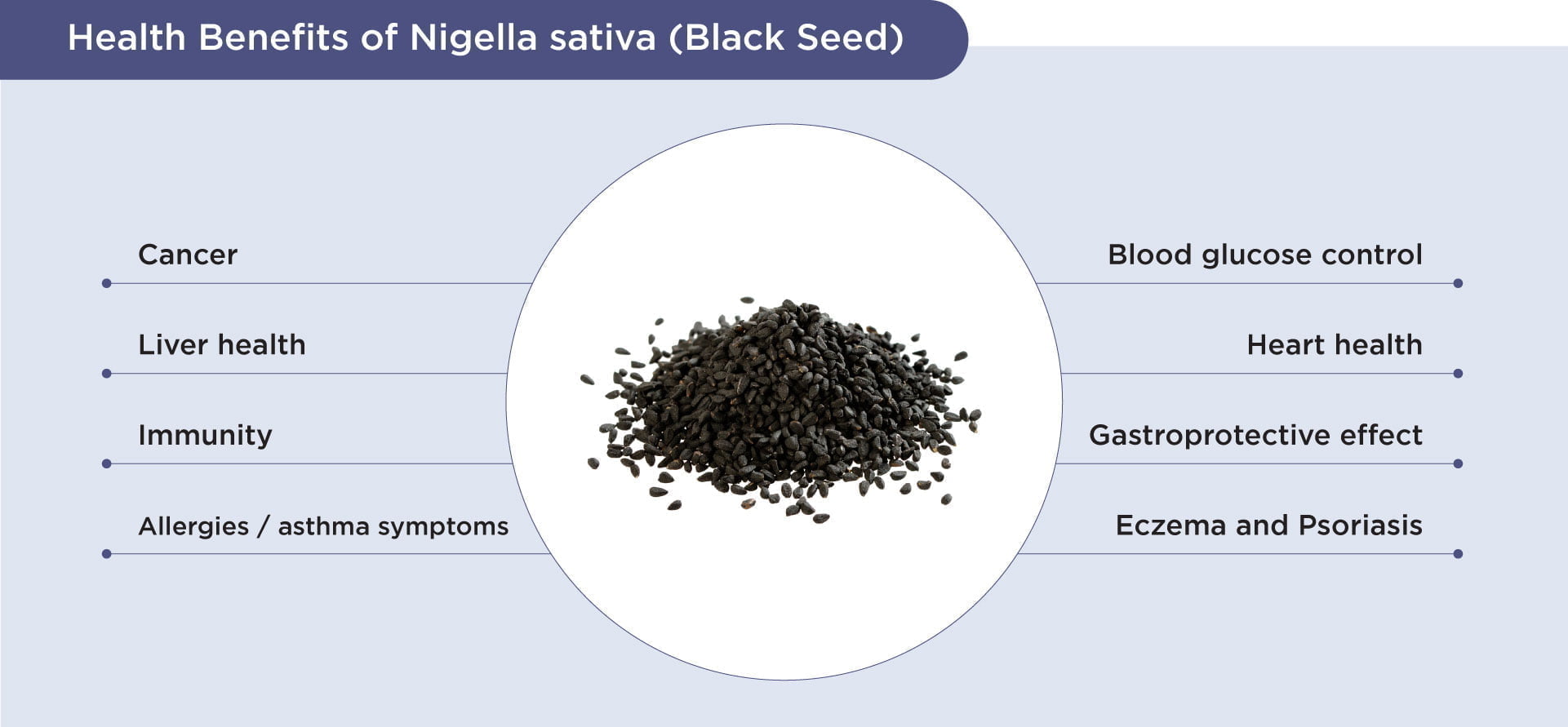Nigella sativa (Black seed)

Nigella sativa (Black seed)
Nigella sativa is an annual flowering plant, which grows in countries bordering the Mediterranean Sea, Pakistan and India 1. This plant is known by numerous names, for example black cumin, black caraway seeds, shonaiz, kalajira, habbatu sawda and habatul baraka 2. The seeds of Nigella sativa, commonly known as black seed, have been used traditionally in Middle Eastern and Far Eastern Countries to treat various diseases pertaining to respiratory system, digestive tract, cardiovascular system, immune system support, kidney, and liver function 1,2. Avicenna refers to black seeds in the “The Canon of Medicine”, as seeds stimulate the body’s energy and help recovery from fatigue and dispiritedness 1.
Nutritional Facts
Nigella sativa is a good source of nutrients and minerals. It is loaded with trace elements such as Amino acids, Saponin, Crude fibre, Crytalline Nigellone, Calcium, Manganese, Copper, Iron, Phosphorus, Potassium, Selenium, Biotin and Magnesium 1,2. Many of the pharmacological activities have been attributed to the quinone constituents in the seed. Thymoquinone is the main active constituent of the volatile oil in black seed. Many investigations have been carried out to understand its pharmacological action such as immune stimulation, anti-inflammatory, anti-inflammatory, anti-cancer, antioxidant, anti-parasitic, hypocholesterolemic effect and hypoglycaemic effect 1,2,3.
Published Health Benefits
1. Cancer
Nigella sativa is high in antioxidants, which help neutralize harmful free radicals that can contribute to the development of disease such as cancer. Thymoquinone has impressive anti-cancer properties in cancers of lungs, pancreas, prostate, breast, cervix, skin and colon 1,2.
2. Liver Health
Thymoquinone is a key ingredient in Nigella sativa that protects the liver due to its antioxidant and anti-inflammatory activity. It also reduces fat accumulation in the liver and prevents liver fibrosis 1,2.
3. Immunity
Nigella sativa strengthens the immune system by enhancing natural killer cells to fight viral infection 2,3. Nigella sativa is also a natural antibacterial, with several studies showing that it can reduce even virulent strains of Salmonella and other bacteria that are resistant to antibiotics 2.
4. Allergies / Asthma Symptoms
The bioactive components of Nigella sativa – Thymoquinone and Nigellone have antihistamine activity. Studies show that those with sinusitis and allergic rhinitis taking Nigella sativa had reduced symptoms of nasal congestion, runny and itchy nose and sneezing. Research also suggests that taking black seed extract improves coughing, wheezing and lung function in people with asthma 1,2.
5. Blood Glucose Control
Nigella sativa regulates the liver enzyme activity associated with glucose metabolism and reduces the formation of glucose in the body, thereby reducing fasting glucose levels. Thymoquinone also helps in preservation and proliferation of pancreatic beta cells, thereby decreasing insulin resistance and reducing glycosylated haemoglobin (HbA1c) 1,2,3.
6. Heart Health
Thymoquinone reduces the levels of total cholesterol, LDL, and triglycerides, while increasing HDL concentration 2. It also reduces blood pressure in mild hypertension patients 3.
7. Gastroprotective effect
Thymoquinone has a gastroprotective mechanism that can reduce gastric enzyme activity and inhibit acid secretion. This helps to protect the stomach lining against the formation of stomach ulcers 1,3.
8. Eczema and Psoriasis
The main bioactive components in Nigella sativa – Thymol, Thymoquinone, Thymohydroquinone and Lauric Acid have great antioxidant and anti-inflammatory properties, which help in reducing inflamed, itchy skin in eczema and psoriasis patients. These components also improve skin healing, reduce tissue impairment, and fight viral, bacterial and fungal infections 1,2.
References:
1. Ahmad, A., Husain, A., Mujeeb, M., Khan, S. H., Najmi, A. K., Siddique, N. A,, Damanhouri, Z. A & Anwar, F. (2013). A review on therapeutic potential of Nigella sativa: A miracle herb. Asian Pac J Trop Biomed, 3(5), 337-352. https://www.ncbi.nlm.nih.gov/pmc/articles/PMC3642442/
2. Islam, M. T., Guha, B., Hosen, S., et al. (2017). Nigellalogy: a review on Nigella sativa. MOJ Bioequiv Availab, 3(6), 167-181. https://medcraveonline.com/MOJBB/nigellalogy-a-review-on-nigella-sativa.html
3. Kooti, W., Hasanzadeh-Noohi, Z., Sharafi-Ahvazi, N., Asadi-Samani, M., & Ashtary-Larky, D. (2016). Phytochemistry, pharmacology, and therapeutic uses of black seed (Nigella sativa). Chinese journal of natural medicines, 14(10), 732–745. https://doi.org/10.1016/S1875-5364(16)30088-7









